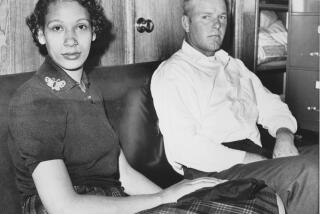Lovingkindness by Anne Roiphe (Summit: $16.95; 256 pp.)
- Share via
In both her fiction and nonfiction over the last two decades, Anne Roiphe has addressed topical social issues: women’s liberation, homosexuality on campus, child psychology; the list goes on. In her new novel, “Lovingkindness,” she has chosen as her subject matter two topics of public discourse in the ‘80s, which, in their intersection, raise several important questions about the lives of contemporary women.
The first is the recent embracing of an Orthodox faith by a growing number of American Jewish women (mirrored in the larger culture by the growing number of fundamentalisms and orthodoxies in all religions). This implicit rejection of the goal of equality for men and women--adherents are governed by halacha, a religious code of law created and interpreted exclusively by men--has made these baalot teshuva, “the returned,” a subject of debate among Jewish feminists. Indeed, the privatization of these women’s lives within the family reduces them to a single social role, that of wife and mother.
Motherhood itself is the second topic of Roiphe’s novel--specifically, being the mother of a daughter--a subject that continues to undergo literary as well as cultural redefinition. After the more idealized mother/daughter relationships in fiction of the ‘70s, in this decade, women writers have shown us a more inclusively psychological hence ambivalent portrait. We read “Lovingkindness” in the context of Vivian Gornick’s extraordinary memoir, “Fierce Attachments”; Marilyn French’s new novel, “Her Mother’s Daughter”; Mona Simpson’s “Anywhere but Here,” and Sue Miller’s, “The Good Mother.”
“Lovingkindness” is narrated by Annie Johnson--feminist, writer, New Yorker, single mother, and secular Jew--who reveals herself to us through a harrowing meditation on motherhood, brought on by a phone call from her daughter, Andrea, in Israel. Andrea, at age 22, has been thrown out of numerous schools, has had three abortions, has succumbed to drugs and the fashion of shaved heads, and has attempted suicide, the fast way, once. (I present this in the tone of the narrative.) So you could say, the last thing Annie expects to hear is what she does: that Andrea is now living in Bruria Yeshiva in Israel and has become a member of a conservative sect of Judaism.
A turning point comes when Andrea writes that she is going to be married by the Yeshiva community to a young American, Michael, whom she’s met only once. Annie corresponds briefly with the boy’s parents, before all three decide to fly to Israel. Now the narrative swings into action, and when Michael’s father kidnaps his son back from the Yeshiva, it throws Annie into a dilemma that purports to be the moral center of this novel but is not.
Certainly, Roiphe intends us to be disturbed by the parents’ overpowering need to have their children carry on their own work and values, at the same time that that generation’s commitment is to individual choice and modernity. A similar dichotomy lies in the fact that while they bemoan the fate of their children, the parents cannot call th1701409312presents a barren emotional landscape in which three generations of women (Annie, her mother and daughter) cannot connect with men or each other.
In fact, Annie’s decision to do right by her daughter at the end of the novel is an act of personal integrity and not the breakthrough act of love for her daughter that it is supposed to be. Where is Annie’s grief for all Andrea has undergone? And for a whole new generation of dropout youth, who are this time in pursuit not of free love but of self-annihilation? The human information in this novel calls for a profound sadness that is nowhere apparent. An impoverishment of vision and feeling on the part of the narrator does not do justice, either, to her own predicament as a woman and mother.
Annie is presented here as a mother who has been unable to be what psychologists call “good enough,” in spite of her intelligence, her “liberation,” her integrity. Rabbi Cohen writes of Andrea’s taking a Hebrew name: “We felt that Sarai would be an especially appropriate name for your child because she seemed so in need of mothering and Sarah was the mother of the entire Jewish people.” That love is to be found neither among individuals nor even in a nuclear family but only in religious community is the reactionary, perhaps inadvertent, message of this novel, its real moral center. Serious and provocative, “Lovingkindness” will perhaps appeal to other readers in a way it can’t to this one.
More to Read
Sign up for our Book Club newsletter
Get the latest news, events and more from the Los Angeles Times Book Club, and help us get L.A. reading and talking.
You may occasionally receive promotional content from the Los Angeles Times.









